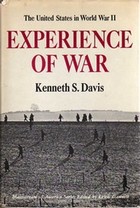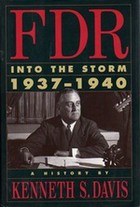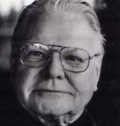 A very long time ago, I checked a book titled The Experience of War out of my high school library. It didn’t look too inviting–the cover is a photo of small black figures–soldiers–walking across a dark gray field, silhouetted against a light gray sky. The pages were filled with long, dense paragraphs of small print. But it was two inches thick, and at the time, I thought size mattered–at least when it came to impressing my classmates with my seriousness.
A very long time ago, I checked a book titled The Experience of War out of my high school library. It didn’t look too inviting–the cover is a photo of small black figures–soldiers–walking across a dark gray field, silhouetted against a light gray sky. The pages were filled with long, dense paragraphs of small print. But it was two inches thick, and at the time, I thought size mattered–at least when it came to impressing my classmates with my seriousness.
I only got about 200 pages into the book before I had to return it, and for whatever reason, I didn’t check it out again. But I can remember being profoundly impressed by how … well, I guess I would say, cinematic the book was. It wasn’t like other history books I’d read–setting aside things like The Great Escape as adventure rather than history, that is. It wasn’t a sequence of “this happened and then this happened” facts, with an occasional bit of analysis. It was a series of scenes. Wendell Willkie in the Commodore Hotel in Manhattan, listening to the returns from the 1940 Presidential election. General Jonathan Wainwright waiting for the end in a tunnel on Corregidor. Navy pilots spotting and attacking the Japanese carrier Kaga just as they reach the very limit of their range, opening the battle of Midway. Harry Hopkins, already suffering from stomach cancer, flying from Washington to London and then on to Moscow to meet with Stalin in the early days after the Nazi invasion of the Soviet Union–and then back to Scotland to meet up with Churchill and travel to the first Atlantic conference:
For twenty-four hours he is in troubled air, his sick body tossed and buffeted. He has barely strength enough to jump from the plane to the slippery deck of an admiral’s launch, at Scapa Flow, when at last the flying boat comes down. A sailor with a boat hook hauls him sprawling across the deck to the safety of the cabin. But he laughs! He laughs at this undignified arrival of the President’s personal envoy upon a British boat. He laughs at his sickness, his weakness. He waves a cheery farewell to the crew of the PBY, whose captain will later speak in awestruck tones of his passenger’s “unbelievable courage,” his “splendid devotion to duty.”
Almost twenty years later, I pulled down a copy of The Experience of War from a bookstore shelf and began thumbing through it. My first reaction was much the same as before: “Hmm … looks very thick, slow, and dry.” But then I hit that passage about Hopkins again, and I suddenly remembered, and decided right there to buy the book and immediately begin reading it again. At the time, I was flying regularly from Washington to Denver and back, usually in the same day, and a good, thick book I could sink into was something I really needed.
But then, around 300 pages into it, I ran into the following at the start of chapter ten: “Let George do it, the saying goes. So call him George.” George is a Marine, and Davis leads us through his enlistment, his basic training, his transport to Hawaii, his transport to a ship off an island in the Southwest Pacific, to George’s part in the island’s assault and bitter conquest.
George is a fictional character.
I found this quite disconcerting. Was this whole thing just a crock, I wondered? Was Davis just toying with the reader?
But eight pages later, we were back in real history, travelling around the world with Wendell Willkie on his 1942 propaganda tour at FDR’s request, and for the rest of the book, we stayed in what I considered safe territory. Edmund Morris’ Dutch was still ten years in the future and I thought mixing fact and fiction was like adding even and odd numbers–in the end, the result would always be fiction.
In his prefatory note to The Experience of War, Davis wrote,
This is a book about the American experience of World War II. It is not designed to be a formal academic history, though every effort has been made to assure its factual accuracy. Rather, its essential purpose is literary in that it attempts to rescue from the erosions and abstractions of Time something of what Webster’s Dictionary, in the definition of “experience,” calls the “actual living through an event or events; actual enjoyment or suffering.”
Looking through the reviews that greeted the publication of The Experience of War, you can see that the majority of reviewers stumbled over exactly the same point I did. Most praise the work’s overall breadth and richness of detail, but caution the buyer to beware that the whole package could be considered tainted by the one detour into creative writing. Almost three decades later, the fine historian David Hackett Fisher could still sniff that the book “promiscuously mixes fiction and fact.” Eric Goldman, writing in the New York Times was one of the very to express unqualified praise, calling it, “…[H]istory in the grand manner, broad and powerful in its themes, eloquent in style …,” and noting its “sharply etched vignettes of people and scenes.”
Soon after publishing The Experience of War, Davis began work on the project that consumed the rest of his life–over thirty years–and ultimately end unfinished: his massive five-volume, nearly 4,000-page biography of Franklin Roosevelt. His first volume, FDR: The Beckoning of Destiny, 1882-1928 published in 1972, was a critical and commercial success, earning him the Francis Parkman Prize from the Society of American Historians.
From there on, however, it was a long downhill slide. Walter Goodman’s Times review of the second volume, FDR: The New York Years 1928-1933 (1985), ended with this litany of faint praises: “He is an assiduous researcher, a creditable psychologist, a fair-minded analyst and, when he isn’t trying too hard, an inviting chronicler of the most fascinating political personality of our age.” Irving Howe was much more enthusiastic about the third volume, FDR: The New Deal Years, 1933-1937 (1986), calling it an “admirably rich book – rich in historical substance, political thought and character portraiture.”
He did note, however, that, “Sentence by sentence, Mr. Davis is not a bewitching writer: he has a curious weakness for stiff syntax and cumbersome phrasing.” And it must be said that the significant obstacle for Davis’ readers is less an occasional dalliance with fiction but his almost nineteenth century prose style.
At times, it can be completely over the top, as in this passage from The Experience of War:
High hopes. Bright hopes …
But then, abruptly, deep disappointments. Dark disappointments, and even despairs …
The bright and the dark ran side by side in a rush of contrasting events through the weeks after Yalta; they thrust against one another and tumbled over one another as if struggling for the minds of men …
I can only imagine what Professor Sale would have written if I’d turned in a paper with that tempestuous bit of prose. It’s Bulwer-Lytton grade stuff.
Throughout Davis’ long career, which began with a wartime biography of Eisenhower in 1944 and continued through over a dozen works of biography and history and three novels for over fifty years, reviewers took exception to his stylistic foibles: thousand-word paragraphs composed from sixty-word sentences, topped off with telegraphic exclamation points for dramatic effect: “It made a great stir. Of course it would.” And, yes, those bits of poetic excess no self-respecting dispassionate historian would attempt today:
With decision came liberation. A heavy weight was lifted from Roosevelt’s mind: his long-oppressed spirits could again rise.
 Despite the fact that Random House gave the fourth volume, FDR: Into the Storm 1937-1940 (1993), the biggest publicity push of the whole series, Davis’ reputation continued to decline. Although Robert Dallek acknowledged that the work would “take its place in the Roosevelt literature,” he found the most distinctive aspect of the book “the mass of detail on all the major and many minor events of Roosevelt’s second term.” Boy, ain’t that the kind of acclaim that sells a book: “‘A Mass of Details’ says the New York Times!”
Despite the fact that Random House gave the fourth volume, FDR: Into the Storm 1937-1940 (1993), the biggest publicity push of the whole series, Davis’ reputation continued to decline. Although Robert Dallek acknowledged that the work would “take its place in the Roosevelt literature,” he found the most distinctive aspect of the book “the mass of detail on all the major and many minor events of Roosevelt’s second term.” Boy, ain’t that the kind of acclaim that sells a book: “‘A Mass of Details’ says the New York Times!”
Davis died in 1999, leaving the fifth and final volume unfinished. Mary Ellen, Ralph Titus, and Robert Loomis collaborated to shape the completed portion of the book and Davis’ notes into FDR: The War President, 1940-1943, which was published in 2000. Even so, the book ends in the middle of the war, with Roosevelt screening Casablanca at the White House.
Davis was spared the indignity of the book’s reception, which reminds one of the old joke, “The food here’s terrible–and the portions are so small.” Here is Michael Lind, again from the Times:
FDR: The War President, 1940-1943 is not history. It is sensationalistic historical fiction of the kind associated with Oliver Stone and the Edmund Morris of Dutch. Franklin Delano Roosevelt’s reputation as a historical figure will survive this book. Kenneth S. Davis’s reputation as a historian will not.
One pictures Lind spiking his copy of the book into Davis’ grave and dancing a little touchdown jig.
 So is that the fate of Kenneth S. Davis? To have steadily and diligently written himself into oblivion? At the moment, all but his history of Kansas are out of print. While his FDR books have been referenced by dozens of historians since their publication, as a quick Google Book search reveals, most of the time it’s for their details of color and character than the historical insights. And for readers unprepared for the task, the prospect of lugging a few pounds of a Davis book or sticking with his long, dense paragraphs probably seems like that of reading Proust without the payoff of being able to brag about it at parties.
So is that the fate of Kenneth S. Davis? To have steadily and diligently written himself into oblivion? At the moment, all but his history of Kansas are out of print. While his FDR books have been referenced by dozens of historians since their publication, as a quick Google Book search reveals, most of the time it’s for their details of color and character than the historical insights. And for readers unprepared for the task, the prospect of lugging a few pounds of a Davis book or sticking with his long, dense paragraphs probably seems like that of reading Proust without the payoff of being able to brag about it at parties.
For a few persistent and diligent readers, though, there are considerable rewards. I said early on that I remembered The Experience of War as a cinematic book. Irving Howe, on the other hand, saw the parallel for Davis’ approach in an earlier century: “… [T]he total effect of his book is strongly dramatic, reminding one of those naturalistic novels that marshal lumbering sentences in behalf of narrative drive.” Yes, there are plenty of lumbering sentences. But there are also such vivid, memorable scenes: Eisenhower pacing up and down the runway in Gibraltar, anxiously wondering how successful (or costly) the American Army’s landing in North Africa would be. John Hersey encountering the realities of combat in Guadalcanal. Oppenheimer torn between hope and dread at the first atomic bomb test. David Lillienthal wresting control of the Tennessee Valley Authority from the powerful electric utilities. An ordinary visitor experiencing the marvels of the 1939 New York World’s Fair. Or FDR’s first fireside chat:
There was nothing fake about the hearty, laughing good humor, the optimistic faith (he knew everything would come out right in the end!), the indomitable courage, the incessant, stupendous joie de vivre which he exuded and which others, needful of it, soaked up as parched earth does water.
If what Davis set out to do in his books was, as he wrote in his prefatory note to Experience, to “rescue from the erosions and abstractions of Time” experience–“the actual living through an event or events,” I think we can say he succeeded, even if it was counter to critical preferences.
For the past umpteen years, I’ve usually had one or another of Davis’ books in my nightstand. In between books, I’ll pick it up, open a page at random, and dip in. And almost always, I find myself carried away through the next dozen pages by the power of his story-telling. And for that, I am grateful.
